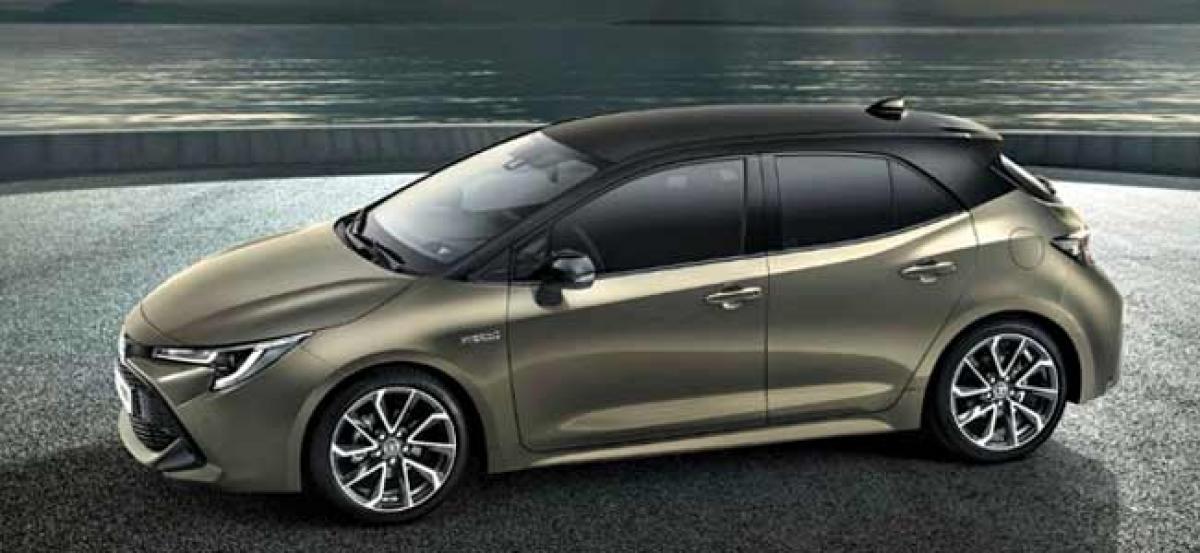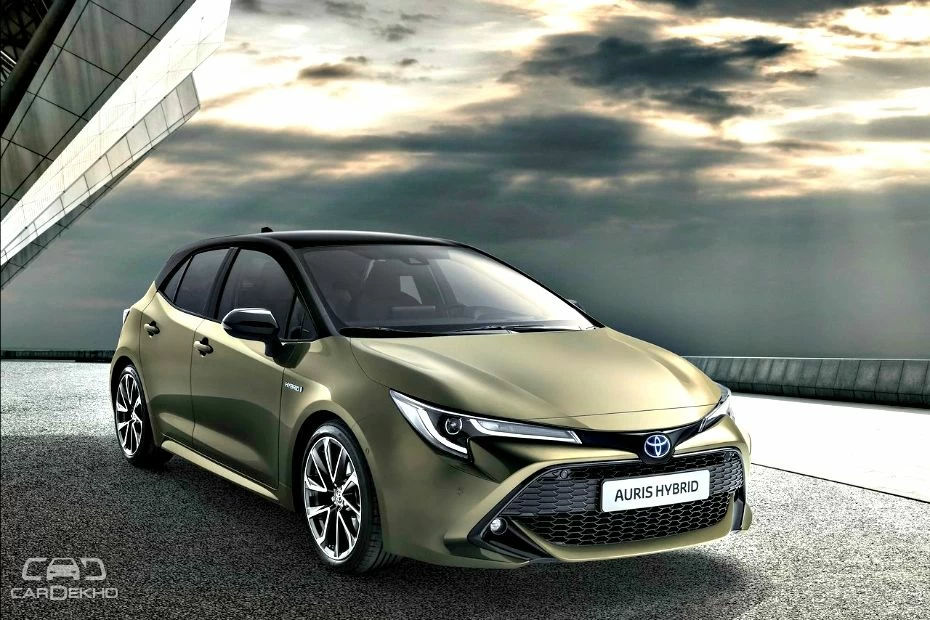Live
- NASA Tracks Five Giant Asteroids on Close Approach to Earth Today
- Pushpa 2 Hits ₹1000 Crore in 6 Days: How It Compares to Other Top Indian Films
- Vivo X200 and X200 Pro Launched in India: Price, Specifications, and Features
- Nitin Gadkari Admits Feeling Embarrassed at Global Summits Over Rising Road Accidents in India
- Comprehensive Review on Indiramma Housing Survey and Welfare Initiatives Conducted via Video Conference
- Jogulamba Temple Records Rs 1.06 Crore Hundi Revenue in 150 Days
- Opposition Slams ‘One Nation, One Election’ Bill as Anti-Democratic; BJP Allies Support the Move
- Celebrate Karthigai Maha Deepam Virtually with Sri Mandir’s LIVE Darshan Experience
- BJP Extends Support to Samagra Shiksha Abhiyan Employees' Strike, Demands Immediate Regularization and Welfare Benefits
- Dr. M. Priyanka Stresses Quality Education, Nutritious Meals, and Cleanliness in Schools
Just In

The Corolla’s hatchback sibling is based on the automaker’s latest TNGA platform now and doesn’t get a diesel engine
The Corolla’s hatchback sibling is based on the automaker’s latest TNGA platform now and doesn’t get a diesel engine in Europe and the sedan could also follow the same route in India

Toyota has revealed the next generation Auris at the ongoing Geneva Motor Show 2018. Why is it important to us? Because it previews the upcoming Toyota Corolla in a lot of ways. The upcoming new generation Corolla – based on the new-gen Auris – is likely to be revealed globally in late 2018 or early 2019, and is expected to be introduced in India in a couple of years.
A Brand New Platform: TNGA

The Auris has shifted to the Japanese automaker’s latest modular platform: Toyota New Global Architecture (TNGA), and the sedan will follow suit. Toyota promises that the new platform is more rigid and has a lower centre of gravity. These attributes promise to improve ride and handling of cars based on this new platform. More importantly, this platform is highly flexible and can spawn a variety of body styles and can be easily electrified as well. There’s a couple of SUVs too that are based on the TNGA and might come to India. Related: Toyota's Upcoming SUV For India – Will It Be The Rush, C-HR or FT-AC?
Does it mean that we’ll get an electric Corolla soon?

While there’s no official word on an all-electric Corolla, it is destined to get a hybrid powertrain for sure. There are also chances that the new-gen Corolla won’t get a diesel engine at all!
Toyota had ditched the diesel engine options (1.4-litre and 1.6-litre D-4D) from the Auris in Europe in late 2017 and the new one also doesn’t feature a diesel engine. The reason stated by the automaker is the declining sales of the diesel-powered versions in Europe. Moreover, none of the TNGA-based cars offer a diesel engine at the moment, and we feel that the new Corolla might as well ditch its diesel engine this time around. The TNGA-based cars are only offered with a hybrid or a petrol option.
Instead of the diesel, Toyota could offer the Corolla’s new 2.0-litre hybrid powertrain, which it will presumably borrow from the Auris, in India. The new 2.0-litre Toyota Hybrid System (THS II) has been specially developed for TNGA-based models and packs a brand new 2.0-litre direct-injected petrol engine from Toyota’s latest Dynamic Force Engine family. Max power output of the hybrid powertrain is a healthy 180PS. The new Auris is also available with Toyota’s existing 122PS 1.8-litre hybrid system that also powers the Prius.
The Corolla hybrid would certainly make a good case for Toyota in India since the Government is likely to enforce CAFE (corporate average fuel efficiency) norms from 2022 onwards, which will require all automakers to have a minimum average fuel efficiency for their lineup. And the already fuel efficient hybrids are poised to definitely meet these norms. Moreover, Toyota already assembles the Camry Hybrid in the country and could easily do the same for the upcoming Corolla as well. Related: Toyota Restarts Camry Hybrid Production
Design

The outgoing Auris and the Corolla Altis that we get in India are not similar to each other when it comes to their design. In fact, they don’t even look like siblings at all and even the previous Auris’ wheelbase and width were different compared to the Corolla’s. It is likely to be the same with the upcoming sedan as well. However, family design similarity will be there. The new Auris features Toyota’s latest avatar of Under Priority Catamaran and Keen Look design philosophy. The massive trapezoidal lower grille holds the maximum real estate at the front and it is likely to be the same case with the upcoming Corolla as well.
Toyota has not revealed the Auris’ cabin, which is likely to be shared with the new Corolla as before. However, one of the press shots has revealed that these cars will have a free-floating display. That said, the touchscreen unit of the Corolla/Auris is unlikely to offer Android Auto connectivity, while CarPlay might be on offer as Toyota’s latest Entune 3.0 infotainment will reportedly offer the same by 2019. For now, none of Toyota’s models feature Android Auto or CarPlay, not even Lexus.
Other expected changes

The Europe-spec Auris continues to offer independent rear suspension (multi-link setup) like before, while the current Corolla features a relatively subpar torsion beam setup at the rear. It is high time that Toyota shifts the Corolla to an independent rear setup, which not only improves ride quality but handling as well. The Skoda Octavia and the upcoming Honda Civic, for instance, offer the same. In fact, the Civic offers it as standard.
If launched, the Corolla Altis Hybrid is expected to be the range-topping offering. The current Corolla is priced between Rs 15.70 - 19.64 lakh (ex-showroom, New Delhi), while its arch rival, the Skoda Octavia, has a price range of Rs 16.02 - 26.25 lakh (ex-showroom, pan India). So, Toyota has enough window to position the Corolla at somewhere between Rs 20 - 25 lakh. Moreover, the next Toyota sedan, the Camry Hybrid, is priced (Rs 37.22 lakh ex-Delhi) at a premium of around Rs 17 lakh compared to the current Corolla. Also, with the implementation of BSVI emission norms, prices of diesel cars are expected to increase substantially compared to their petrol counterparts. In this case, the hybrids could easily replace diesels as they offer better refinement levels and diesel-like efficiency.
Source: cardekho.com

© 2024 Hyderabad Media House Limited/The Hans India. All rights reserved. Powered by hocalwire.com







